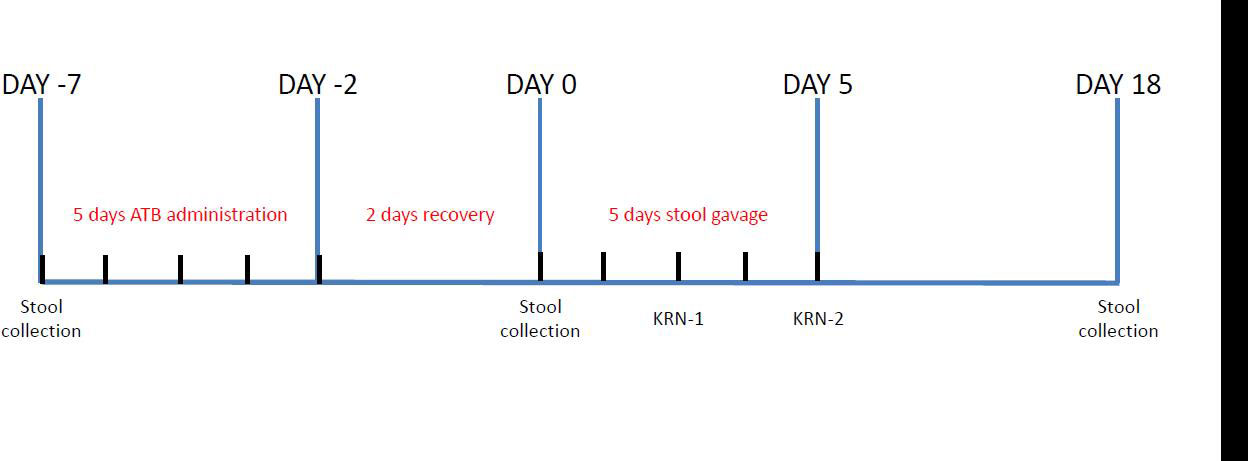Session Information
Date: Monday, November 11, 2019
Title: RA – Animal Models Poster
Session Type: Poster Session (Monday)
Session Time: 9:00AM-11:00AM
Background/Purpose: Magnesium (Mg) plays a key role in the immune response. We have previously demonstrated that alterations in the Mg balance by increasing or decreasing the Mg daily intake significantly protected mice in Collagen Induced Arthritis and KRN serum-induced arthritis. The effect correlated with reduced number of Th17 T cells and increased number of FoxP3+ Treg cells, as well as with a significant reduction in the amounts of Segmented filamentous bacteria (SFB) and a significant increase in the amounts of Bacteroides fragilis (BFR). In this study, we hypothesized that the gut microbiota changes induced by dietary Mg modifications could account for the arthritis protective effect induced by the diet.
Methods: Donor mice (C57BL/6; Taconic) were placed on a low (50 ppm), regular (500 ppm) or high Mg diet (2800 ppm) for 14 days. Fecal samples were obtained on days 14 and 15, homogenized in water (30 mg of fecal pellet in 400 ml) and filtered. Recipient mice (C57BL/6; Taconic) were treated with an antibiotic cocktail containing Metronidazol (140 mg/Kg), Neomycin (140 mg/Kg) and Vancomycin (10 mg/Kg) for 5 days and allowed to recover for 2 days. Recipient mice receiving a regular 500ppm diet were then gavaged daily from day 0 to day 5 with fecal material from the donor mice and arthritis was induced by injecting 100 ml of arthritogenic serum from KRN mice on days 3 and 5. The animals were scored daily for 15 days. Fecal samples were collected before antibiotics treatment (day -7), after antibiotic treatment but before the fecal transfer (day 0) and at endpoint (day 18). Genomic DNA was extracted and the levels of the commensal bacteria BFR and SFB determined by qPCR. Tissues were also collected for histology and flow cytometry analysis.
Results: Antibiotic treatment for 5 days eliminated SFB and BFR content in all groups (stool qPCR day 0). Fecal transfers were completed without problems. Recipient groups receiving fecal transfer from either the low or high Mg diet donor mice had a significant 50% reduction in maximum arthritis severity scores (p< 0.05) and a nearly 30% increase in FoxP3+ Treg and Tr1+ compared with recipients of fecal transfer from the regular Mg diet mice.
Conclusion: This study provides evidence suggesting that the high and low Mg diets reduce arthritis severity and increase numbers of FoxP3+ Tregs via the modulation of the intestinal microbiome and that stools from these mice can transfer these protective phenotypes into recipient mice. Therefore, targeting Mg homeostasis with dietary modifications has the potential to become a new tool to modify the intestinal microbiome to treat autoimmune disorders such as arthritis.
To cite this abstract in AMA style:
Laragione T, Harris C, Gulko P. Fecal Transfer from Mice on High or Low Magnesium Diets Confers Arthritis Protection [abstract]. Arthritis Rheumatol. 2019; 71 (suppl 10). https://acrabstracts.org/abstract/fecal-transfer-from-mice-on-high-or-low-magnesium-diets-confers-arthritis-protection/. Accessed .« Back to 2019 ACR/ARP Annual Meeting
ACR Meeting Abstracts - https://acrabstracts.org/abstract/fecal-transfer-from-mice-on-high-or-low-magnesium-diets-confers-arthritis-protection/

